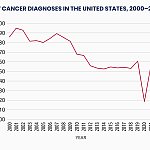
New research suggests that people following a calorie-restricted diet may be at an increased risk of depression compared to non-dieters.
The findings, published on June 2 in BMJ Nutrition, Prevention & Health, found that both calorie- and nutrient-restrictive diets are associated with a higher incidence of depression in individuals with overweight.
Calorie-restricted diets are associated with increased cognitive-affective symptoms in these individuals, while nutrition-restricted diets are linked to somatic symptoms.
Previous studies examining the potential relationship between dieting and depression have not resulted in a consensus on the matter.
The new study is an observational study that cannot directly establish cause and effect. As such, its authors frame it as an effort to contribute to the ongoing conversation.
The cross-sectional study analyzes data collected from 28,525 respondents in the nationally representative
The NHANES study measured the incidence of depression in participants by having them respond to the Patient Health Questionnaire-9 (PHQ-9).
In general, PHQ-9
Most of the participants, 25,009, were not on a diet and served as controls. A higher percentage of males (90%) weren’t dieting than females (85%).
PHQ-9 scores for people on calorie-restricted diets averaged 0.29 points higher than for those who weren’t dieting.
Of participants who were dieting, 2,026 were on a calorie-restricted diet, and 859 were on a nutrient-restricted diet. The remaining 631 were eating according to an established dietary pattern, such as one optimized for a medical condition, such as diabetes or hypertension.
For people with overweight, increases in PHQ-9 scores were somewhat greater for calorie-restricted diets, 0.46 points, and uniquely elevated for nutrient-restricted diets, 0.61 points.
Ritu Goel, MD, board certified child, adolescent, and adult integrative psychiatrist, told Healthline that many people label foods as either “good” or “bad,” which, over time, may impact how they view themselves.
“Their identity becomes tied to weight, and the number on the scale begins to shape their sense of self-worth,” Goel explained.
Rachel Goldberg, LMFT, PMH-C, a therapist specializing in eating disorders and body image in Los Angeles, CA, echoed this sentiment.
“Many people begin restricting in an effort to control their diet, almost always with the goal to lose weight,” she told Healthline. “But inevitably, this leads to eating more than planned and feeling out of control. On a physiological level, calorie restriction lowers a person’s bandwidth to handle stress.”
Extended restrictive diets can result in low levels of protein, iron, and vitamin D, for example.
“In attempting to ‘fix’ one area of health, individuals may inadvertently disrupt others, particularly mental health,” Goel suggested.
Goldberg reported that her clients become “more upset at things that typically wouldn’t bother them, or they stop feeling joy for things they used to.”
“Restriction isn’t a shortcut. It’s a trap, because it’s not sustainable and keeps you in a painful loop that takes up your mental energy,” she added.
A calorie is a unit that measures energy:
The number of calories a person requires depends on several factors, including gender, age, and level of physical activity.
In general, most females need a minimum of 1,600 daily calories to maintain their weight, while males may need a minimum of 2,000 calories.
Michelle Routhenstein, MS, a registered dietitian specializing in heart disease, told Healthline she often works with people after they tried calorie-restrictive diets that didn’t work long-term.
Routhenstein said that it’s vital for long-term weight management success to focus on balanced, and therefore, sustainable, changes to the way one eats.
A particularly helpful habit is to practice mindful eating, in which a person learns to pay attention to the body’s true hunger cues as well as easily missed fullness cues.
Pausing toward the end of a meal to give a fullness cue a chance to be “heard” may be a handy trick to help avoid overeating.
Eating on a regular schedule can help reduce unwanted random eating and can also prevent hunger due to overlong periods without food.
As Goel had mentioned, it can be helpful to avoid labeling foods as “good” or “bad.”
“This can backfire,” said Routhenstein. “Instead, focus on choosing foods that provide nourishment and satiety to support a positive and balanced approach.”
Routhenstein recommended seeking support from a registered dietitian “who can offer personalized guidance and accountability on your journey to healthier eating.”
Some foods are believed to be especially helpful for maintaining a positive mood.
These include fatty fish such as salmon and sardines that are rich in omega-3 fatty acids.
Omega-3 fatty acids “have been shown to reduce symptoms of depression and support cognitive function,” said Routhenstein.
Recent research has connected a healthy gut microbiome to mood and emotional health via the gut-brain axis.
Fermented foods, such as yogurt, kimchi, and kefir, are also being examined for their positive impact on mental health.





